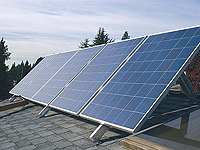Aug 7 2010
Israel is one such country that has advanced solar technology but yet to implement it fully within the country. Recently the public utility authority of Israel has announced an innovative initiative to remove this anomaly and to improve the volume of solar power production.
The new initiative while reducing the power purchasing rate offered by the Utility from the existing 53 cents to 40 cents per kilowatt hour, allows increased volume in purchase. Earlier the government was paying enhanced rate per kilowatt hour, but limited the volume of purchase, and that discouraged the investment in solar energy sector. The current move is in sequence with an earlier announcement by Uzi Landau, National Infrastructure Minister of Israel, that the country will seek 10 percent of total energy supply from renewable energy sources such as wind and solar power by the year 2020.
 Solar Power Panel
Solar Power Panel
Nurit Felter, Public Utility Authority’s spokes person, said the Utility has increased the quantity of Megawatt to meet the government’s target of achieving 10 percent power from renewable energy sources by the year 2020. Chaim Brown, Real Housing Israel’s chairman, said the solar power business pays more than 12 percent on the investments and has become a profitable business.
Dr. Amit Mor, CEO of Eco Energy Ltd, an Israeli consulting firm, while praising the decision, said that the Utility authorities should try out methods to encourage construction of 100 MW ranges of over sized Consecrated Solar Power plants in the deserts and large sized PV plants in other places. He added that instead of relying on countries such as Germany and China, for PV systems the country should focus on manufacturing solar and wind systems that match the needs of Israel.